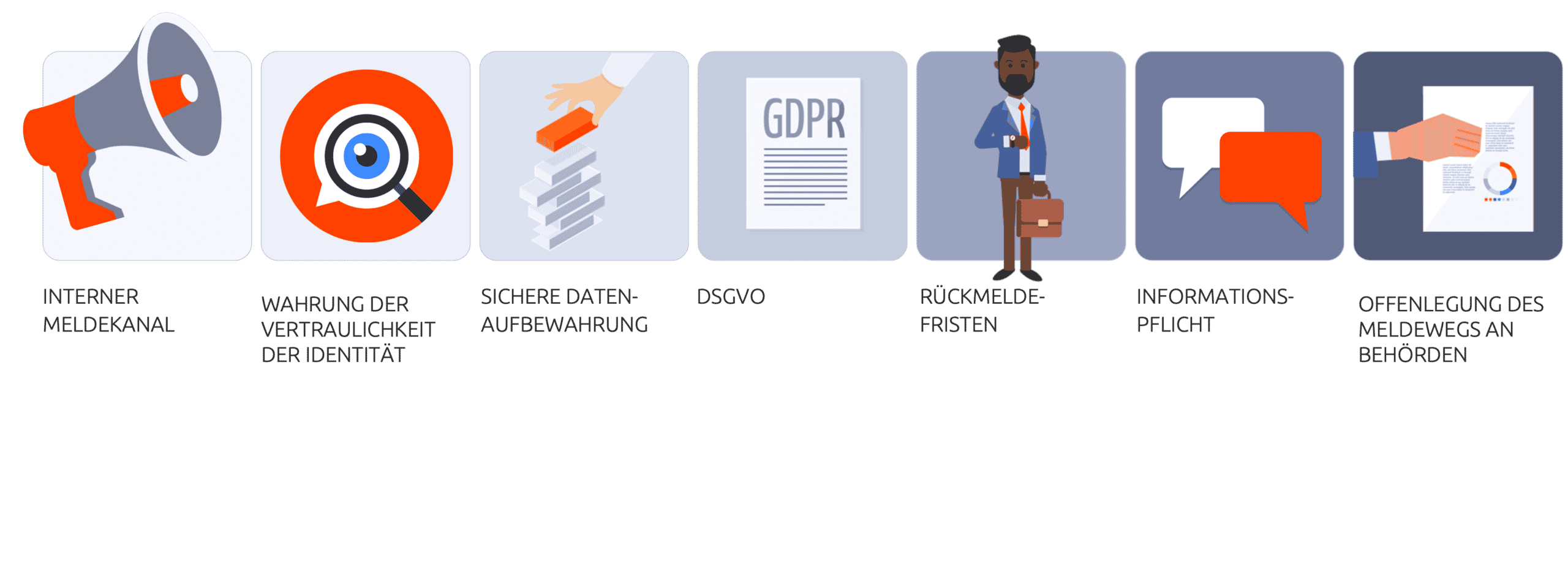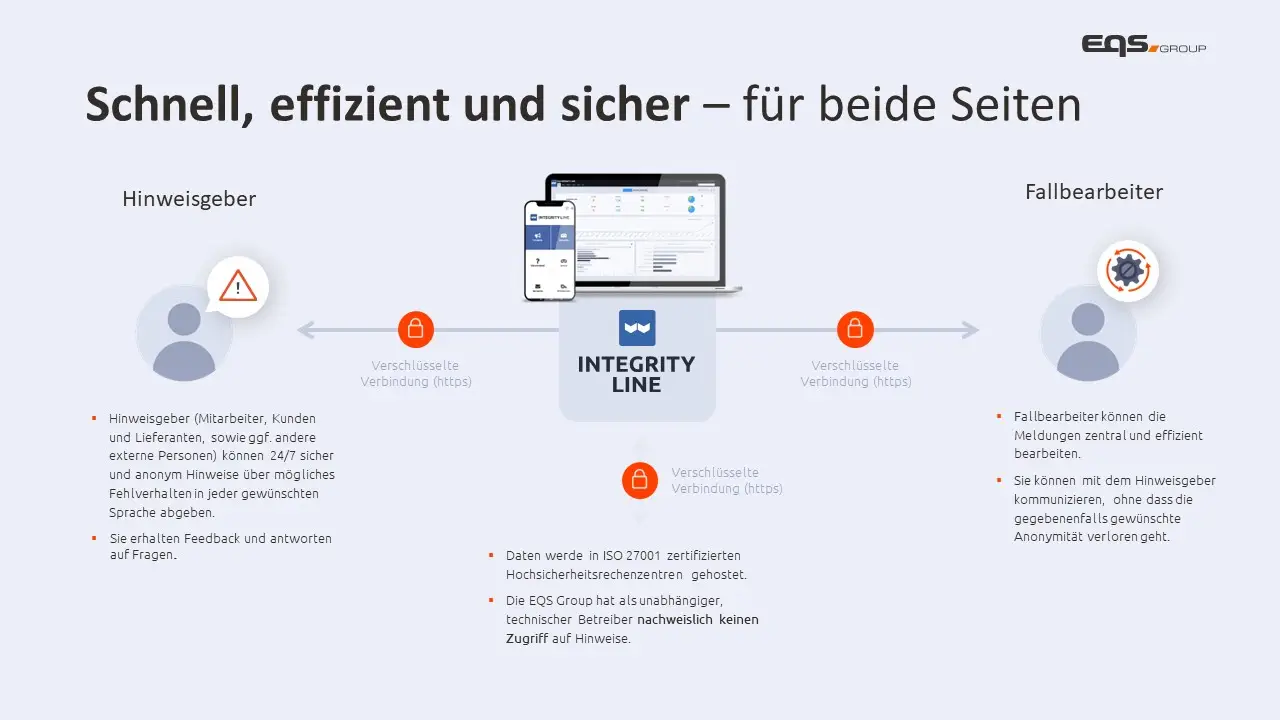Due to constant changes and improvements in legislation, legal compliance requirements are becoming more relevant for many companies every day.
See how corporate compliance and language are connected in our Top 8 presentation and learn why compliance translations are important.
or
Home » Industries/fields » Compliance translations and reporting systems
ACT Translations has been an established specialist for your compliance translations for more than 10 years. Our clients successfully communicate their corporate values and rules worldwide with our translated texts. We have extensive experience in over 90 languages and language variants for all relevant compliance documents.
Our greatest focus is on precision, integrity, and confidentiality. Here we present the top issues currently affecting us in the compliance environment.
Generally, compliance in business and industry is defined as “conduct that complies with the rules, regulations, and ethics”. In other words, it’s not just about complying with the law, but also about boosting ethics and morals within the company;
Acting compliantly means:
Although there are certainly commonalities in terms of general moral values, the way in which these rules, checks, and sanctions are actually defined varies from company to company.
Language and cultural backgrounds have a considerable impact on compliance. Values that are considered ethical in some cultural circles do not necessarily apply to other cultural circles.
All compliance rules, however, have one thing in common: There are always people who do not follow the rules as well as people who report this misconduct and want to be heard. These individuals are called “whistleblowers”. Around two out of every three compliance violations are uncovered by whistleblowers, even though they often have to fear repercussions at work. Once it comes to light who reported the misconduct, the whistleblower could possibly be bullied, blocked from being promoted, or even fired.

EU Directive 2019/1937 was already enforced at the end of 2019. The EU Whistleblower Directive includes comprehensive protection for whistleblowers and stipulates the establishment of secure reporting channels for compliance violations.
It should be particularly emphasized that in this directive, whistleblowers cannot be held legally liable with regard to their tip-offs. This means that whistleblowers do not need to fear any consequences under criminal, civil, or administrative law if they provide information about compliance violations.
This gives you an opportunity to actively address violations before they become a problem. The experts from ACT and EQS will be happy to explain how you can make the most of this opportunity via a web session.
The vast majority of compliance violations are uncovered through tips (cf. link). These tips are only generated by attentive individuals who recognize and report violations right where they occur. By contrast, executives and senior managers who must respond to these issues may be thousands of miles away. Good compliance management removes obstacles from this broad path and ensures that the communication with whistleblowers functions smoothly.
The key here is empathic interaction with other languages, cultures, and real-life circumstances. Translators who are native speakers and therefore understand these subtleties can accurately communicate compliance incidents to your company with the necessary sensitivity. This makes them as important as the IT system and its security.
It is important to choose the right service provider for your compliance communications. Any errors in this respect can have serious consequences. When it comes to legally binding and other compliance documents, trust is the most important factor in establishing a business relationship with your translation agency. This checklist shows you how to achieve this trust and how to select a good service provider:
Experience is an invaluable factor in this field. Experienced language service providers have built up and carefully maintain databases of technical, industrial, and other specific terminology based on many years of experience. This ensures consistent quality across country and language borders.
In the course of working with your language service provider, you will exchange data that includes sensitive information. Your language service provider should operate its business and IT services in a location where privacy and data protection rights are taken seriously.
Only native speakers are able to create a credible basis for trustworthy compliance communication. Not only do they truly know the language. They also understand the culture and pay close attention to unique subtleties that are often missed by non-native speakers.
Did you know that there are additional qualifications for language service providers and translation agencies for compliance communication? Ask about these qualifications when you are choosing your language service provider!
Besides additional qualifications, you should also ask for quality certificates. They guarantee process quality and reliability. We will gladly provide you with our certifications and proof of competence during an online meeting.
Of course, one option is to buy a basic system, install it as is, and thus satisfy the minimum legal requirements. However, it’s obvious that this is not a good option. If it is not used when a compliance violation occurs, the usual unpleasant questions will be joined by yet another question: Why is the acquired system not being used?
To avoid this situation in the first place, it makes sense to introduce a whistleblower system as a corporate culture exercise instead of just as an IT project. Ultimately, you want to create processes that allow people to be heard. The most important aspect of being heard is breaking down communication hurdles such as language barriers. Anyone who is there for their employees, listens to them, and makes them feel understood will be the first person they will talk to. This is your opportunity to listen to your employees.
Compliance communication is multifaceted and complex. Accordingly, the number of documents that need to be created and continuously maintained as part of orderly compliance communication is high. You should always be aware of the current status of the following documents:
Do you know where to find these documents, what they must contain, and how to keep them current? We would be happy to review your specific translation needs.
Companies are increasingly establishing a coherent corporate culture and dedicating more time and effort to it. The associated programs that need to be set up are designed to empower employees to not only act in the interests of the company, but also identify directly with the company. Employees should know what they bring to the company and be aware that they are valued for their contributions. If employees become aware of wrongdoing or compliance violations, it is a courageous and commendable step for them to decide to call attention to that wrongdoing. We recommend to our clients that they embed compliance processes and communications into their corporate culture.
Learn from us, in collaboration with EQS, how to implement whistleblower platforms that employees actually use!
You are currently viewing a placeholder content from YouTube. To access the actual content, click the button below. Please note that doing so will share data with third-party providers.
More InformationMachine translation is an excellent, low-cost option for providing simple communication and selected text types in multiple languages. However, online platforms do not offer the same level of data security as a translation service. Users do not know who sees the source texts and what happens to them afterwards. Thanks to the increasing sophistication of machine translation systems, they are very well suited for translating large volumes of text in a very short time. However, there is still a certain amount of residual manual effort that should only be handled by a language specialist; for example, applying a personalized communication style or local linguistic subtleties.
The key issue is that of anonymity – it is crucial for the protection of whistleblowers and their reports. Ensuring anonymity is a challenging task, especially when it comes to dialog. Whistleblower systems need to ensure not only that a message can be sent, but also that it is possible to communicate with the reporting person without having to know them. Information about whistleblowers can also be obtained from metadata. If it is possible to analyze who entered a report, with which device and operating system, at what time, in which language, and with which IP address, you are only a short step away from removing the anonymity of the whistleblower.

Of course, a lot can be made about how securely this data is stored, but nothing beats the simple approach: Anything that is not logged cannot leak out. The same is true for cryptographic keys. Software vendors can make all sorts of claims about their security. However, you are only truly safe from anonymity breaches by third parties when the software providers themselves have no access to data and you own the cryptographic keys.
In addition, there are other factors that play a significant role: How can the workflows be designed? What does a four-eyes principle look like in the system? To answer all these questions, we’ll be happy to put you in contact with an expert from our partner EQS.
Compliance and the accompanying communication have always been important. But nowadays, more than ever before, the topic is attracting particular attention from the legislature and will thus also be in the public eye.
Implementing appropriate systems is not the solution to everything. Nonetheless, implementing the system in your company at least shows that the company is aware of the problem and is willing to improve. However, in contrast to the usual best practices in IT projects, there are a few special factors: Desired principles that are normally a top priority, such as single sign-on (SSO) and the deepest possible integration into other systems and business processes, are not only problematic here, but should be strictly avoided. Common practices such as leaving super-user or admin access in IT are also taboo here, because it should also be possible to reliably report IT misconduct on such systems.
However, the highest standards also apply to the treatment of language in the compliance environment. Compliance translation is another step towards inclusion and accessibility for companies. Therefore, for you as a client, the following applies: Translation service providers and platform providers must be able to act in perfect coordination. Within the framework of the EQS/ACT partnership, this is exactly that we offer you.
Arrange a consultation with us and let us convince you.
Your personal contact provides expert and solution-oriented advice. We use cutting-edge technology and a sure feel for languages to deliver expert, on-target translations.
Your deadlines are our deadlines, and we strive to make the whole process easy for you. That’s what we mean by quality. Our translation service goes the extra mile.

Kirti Sawhney-Kersten, Key Account Manager
Phone: +49 2161 56711 – 59
Email: [email protected]
You need to load content from reCAPTCHA to submit the form. Please note that doing so will share data with third-party providers.
More InformationYou are currently viewing a placeholder content from ProvenExpert.com. To access the actual content, click the button below. Please note that doing so will share data with third-party providers.
More Information